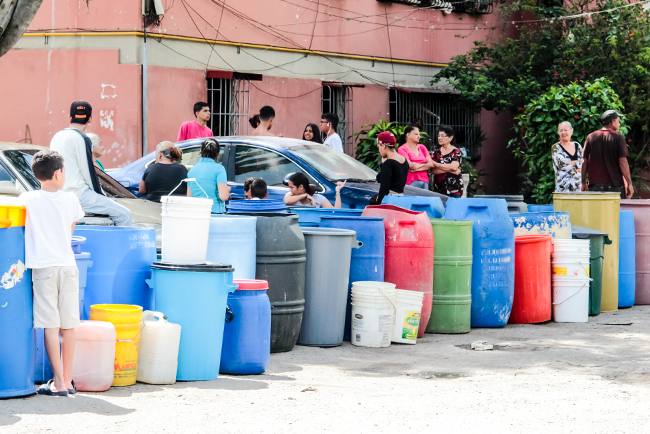Right to Water and Sanitation

The CHE in Venezuela blocks, among other rights, access to potable water and sanitation. The country has enough water sources to supply its entire population; however, the dismantling of the institutional and physical structure of the sector compromises the quality of the supply, the processes of water treatment and purification, distribution, sanitation, health, and hydroelectric production. The destruction and contamination of basins and aquifers, denies access to water resource sources, even in supposedly "pollution-free" areas.
The human right to water is to have a sufficient, regular and adequate supply of drinking water for personal and domestic use, which must be safe, acceptable and at bearable costs that guarantees health and satisfies consumption, cooking and hygiene needs.
The guarantees to this right require that there be no interruption or arbitrary or unjustified disconnection of water services or facilities, denial of access due to discrimination or disproportionate increases in their price.
It also includes the right to the conservation, management and protection of water resources in a sustainable manner, as a natural resource and as a social and cultural good, and the right to a human habitat free from the health hazards of unsafe or contaminated water
National Report
82% of the population does not receive water on a continuous basis and the water received is sometimes of dubious quality or undrinkable. The distribution networks are not maintained.
The lack of maintenance of drinking water distribution networks and household connections causes losses of 5,400 liters per second of already treated water.
The wastewater collection service has decreased drastically. In 2011, only 30% of the population's sewage was collected.
75% of public health centers do not receive water continuously or at all. Hospitals have serious water quality and sanitation problems.
Educational establishments at all levels, from primary school to university, suffer from severe deficiencies in water service, health problems and/or flooding.
The alteration of watercourses, which receive wastewater without adequate treatment, to other water bodies, is causing their contamination and eutrophication.
Water management governing bodies are dismantled, there is no access to information and there are several cases of corruption in the execution of works.
Pumps, valves and water distribution pipes have already reached the end of their useful life and there is no possibility of replacing them. The treatment plants have been dismantled.
Surface and underground water bodies are being contaminated by intensive extractive activity, as well as by agrochemicals and open dumps.
The water-producing basins, inside and outside the National Park System, are being intervened, cut down and contaminated, reducing their flow.